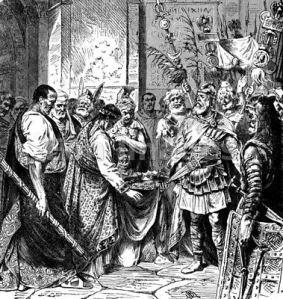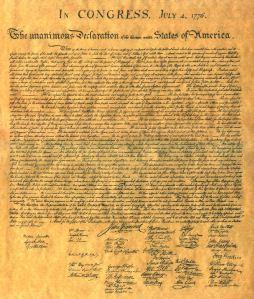History is the interpretation of the significance that the past has for us. - Johan Huizinga
 Those of you who were paying attention in world history class may remember that the Western Roman Empire ended on September 4th, 476 AD with the accession of Flavius Odoacer as King of Italy, and that the Eastern Roman Empire was thereafter known as the Byzantine Empire. But this is merely a convenient lie invented by historians; to the citizens of Rome, Italy, areas of Europe still dominated by either Eastern or Western Empires and foreign governments who had dealings with the Romans, 476 was very much like 474 and 475 had been, and nobody noticed much change in the years 477-493, either. To be sure, the Empire under Odoacer was quite a different place than it had been under Augustus, but then the same could be said of the Empire under Hadrian, Constantine, Honorius or Justinian. The laws, structures and political realities had changed dramatically (and not for the better) since the end of the Republic, yet even when the vast territory was divided in two (temporarily, then later permanently) it was still called the Roman Empire, and its people still thought of their government as continuous with what had gone before. The term “Byzantine Empire” for the eastern half is a total fiction; it was still referred to both officially and in popular use as the Roman Empire (even after its territory had shrunk to only part of the area of modern Turkey) until Constantinople fell to the Ottoman Turks in 1453. And even then, Germanic kings who had been granted the title of Roman Emperor by Papal edict continued to use it until the last of them, Francis II, abdicated the title to Napoleon in 1806.
Those of you who were paying attention in world history class may remember that the Western Roman Empire ended on September 4th, 476 AD with the accession of Flavius Odoacer as King of Italy, and that the Eastern Roman Empire was thereafter known as the Byzantine Empire. But this is merely a convenient lie invented by historians; to the citizens of Rome, Italy, areas of Europe still dominated by either Eastern or Western Empires and foreign governments who had dealings with the Romans, 476 was very much like 474 and 475 had been, and nobody noticed much change in the years 477-493, either. To be sure, the Empire under Odoacer was quite a different place than it had been under Augustus, but then the same could be said of the Empire under Hadrian, Constantine, Honorius or Justinian. The laws, structures and political realities had changed dramatically (and not for the better) since the end of the Republic, yet even when the vast territory was divided in two (temporarily, then later permanently) it was still called the Roman Empire, and its people still thought of their government as continuous with what had gone before. The term “Byzantine Empire” for the eastern half is a total fiction; it was still referred to both officially and in popular use as the Roman Empire (even after its territory had shrunk to only part of the area of modern Turkey) until Constantinople fell to the Ottoman Turks in 1453. And even then, Germanic kings who had been granted the title of Roman Emperor by Papal edict continued to use it until the last of them, Francis II, abdicated the title to Napoleon in 1806.
By the 14th century it would have been obvious to all but the dullest historians that neither the German nor the Greek pretenders to the title of “Roman Empire” were remotely the same as the original entity which had borne that name, and unconnected to it by anything other than a long and winding chain of historical events. But it would not have been so obvious to an historian of the 10th century, and one of the 6th would probably have violently disputed the claim (at least in the case of the Eastern Empire). Modern scholars looking at the events from over a millennium later decided that after 476, things began to change so dramatically and so quickly that a different name needed to be applied to the political entities existing after that date so as to make the difference clearer for purposes of study and discussion. But the people living at that time had no such historical perspective; few of them would have agreed that the differences between Odoacer’s reign and that of Julius Nepos were any more meaningful than those between the reigns of Constantine and Constantius, and probably less significant than the difference between the reigns of Diocletian and Aurelian. They were emotionally invested in the name “Roman”, and the changes in both the Empire and its people had been so gradual that only by viewing the events from a period completely removed from them could a meaningful line be drawn between “Roman” and “Post-Roman”.
Rome is an especially prominent and striking example, but by no means the only one; except in cases where a culture is completely overrun by wholly alien invaders (as in the case of the European conquest of the Americas), most lines drawn between historical periods and most names given them by historians are rather arbitrary and only make sense to people of later eras. Those living at the time see no seismic shift, no change of identity; the English still considered themselves English after the Norman Conquest, and the lives of peasants were largely the same in 1067 as they had been in 1065…but historians regard the unified England of the late 11th century as a different thing from the Anglo-Saxon realm of a generation before, and not only because the rulers were speaking a different language.
 Exactly two months short of exactly 1300 years after what we now think of as the end of the Roman Empire, a group of colonies belonging to a country which had itself once been a Roman province declared themselves independent of their parent nation. And though colonies, provinces and other dependent entities had done this sort of thing many times before, what made this one unique in world history was that the revolutionaries were not merely the followers of a rival monarch determined to wrest the territory from its legal ruler by military force; instead, they were philosophically-inclined sons of the Enlightenment who argued that human beings had certain unalienable rights which no ruler, no matter what his titles or antecedents, had the right to abrogate. This was such a new idea that historians recognized it as a dividing line as soon as the British government did, five years later…but for the average working man, not much really changed, and for the slaves absolutely nothing did. Even most of the laws of the states and cities of the new country were the same laws they had before the revolution…laws based on traditions dating back to the time when almost no educated person would have agreed that the Roman Empire was a thing of the past.
Exactly two months short of exactly 1300 years after what we now think of as the end of the Roman Empire, a group of colonies belonging to a country which had itself once been a Roman province declared themselves independent of their parent nation. And though colonies, provinces and other dependent entities had done this sort of thing many times before, what made this one unique in world history was that the revolutionaries were not merely the followers of a rival monarch determined to wrest the territory from its legal ruler by military force; instead, they were philosophically-inclined sons of the Enlightenment who argued that human beings had certain unalienable rights which no ruler, no matter what his titles or antecedents, had the right to abrogate. This was such a new idea that historians recognized it as a dividing line as soon as the British government did, five years later…but for the average working man, not much really changed, and for the slaves absolutely nothing did. Even most of the laws of the states and cities of the new country were the same laws they had before the revolution…laws based on traditions dating back to the time when almost no educated person would have agreed that the Roman Empire was a thing of the past.
But less than a hundred years later, that began to change; the United States now bears more resemblance to the bloated, top-heavy, militaristic, moribund Roman state inherited by Odoacer than the lean, minimal government conceived of by the Founders. Yet for now, the people of the US are still so emotionally invested in the label “American” and so blindly devoted to worship-words like “freedom” that they are unable to recognize that we’ve already crossed the line future historians will draw between the American Republic and the American Empire. When did we pass from one to the other? Alas, I’m in the same forest as you are; only the perspective of time will allow us to determine that. Perhaps they’ll draw it at the end of the Cold War; perhaps even earlier, at the end of World War II. Maybe they’ll make it simple for student memorization by setting it at the beginning of the 21st century. But one way or another, it is insulting to the Founders’ memory to associate any patriotic feelings you have for the memory of the nation they created with the repressive fascist police state that now occupies its territory; the 4th of July is now a memorial rather than a celebration, and the Spirit of ‘76 is nothing but a ghost.
